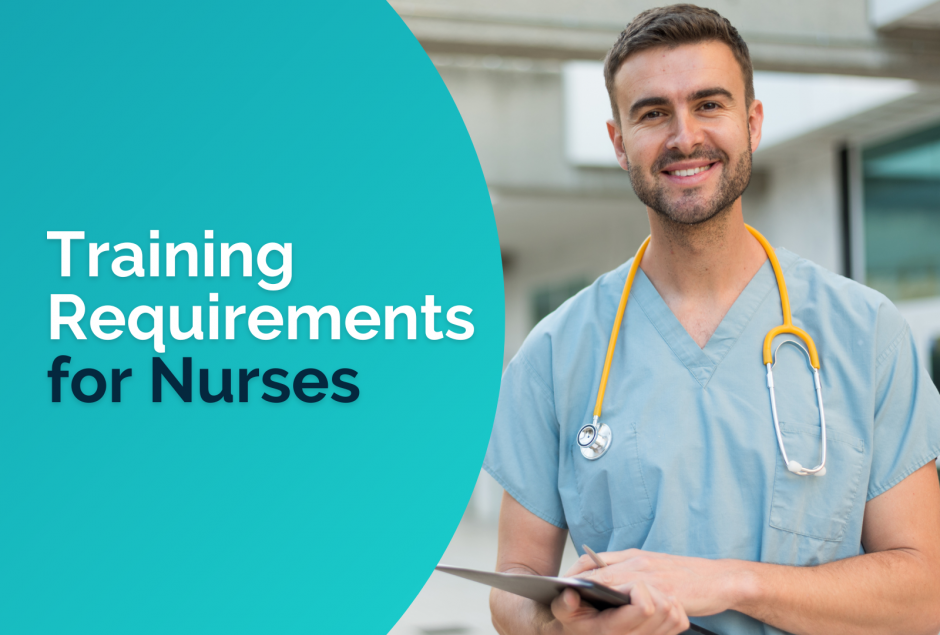 Menu
Menu
 Menu
Menu
If you're a nurse contemplating a move to Ireland or are already practicing nursing in the country, you'll be pleased to know that the Emerald Isle has a wide range of training and development opportunities to support your professional growth and career advancement. From online learning portals to postgraduate education programs, Ireland provides a nurturing environment for nurses to enhance their skills. In this article, we'll explore the various avenues available for your professional development as a nurse in Ireland.
HSeLanD is the Irish Healthcare Services national online learning and development portal. It's a mandatory platform for all healthcare professionals, including nurses, to register and complete essential training courses. The HSeLanD website can be accessed here.
As a registered nurse in Ireland, you are required to complete the following courses online:
...and more, based on your specialty.
All the above courses on HSeLanD are free and can be accessed at any time during the day or night.

List of services available from HSeLanD
The Nursing and Midwifery Board of Ireland (NMBI) plays a pivotal role in regulating and overseeing the education and training of nurses in the country. This includes nurses who have relocated to Ireland. Upon registration with NMBI, nurses can take advantage of a variety of postgraduate education programs, specialised training courses, and opportunities for continuous professional development (CPD).
The NMBI are also key for training as they outline and support nurses in the standards and guidelines of patient care. All registered nurses and midwives are encouraged to be familiar with the following content:
The Irish Nurses and Midwifery Organisation (INMO) is Ireland's largest professional nursing/midwifery organisation. They advocate for optimal patient care and while providing various benefits to members, including professional representation, legal and counselling services. Additionally, the INMO offers tailor-made courses in numerous development specialties.
Postgraduate education programmes are awarded after completion of a university degree, and are a gateway to enhancing your knowledge and skills as a nurse. These programmes cover areas such as advanced nursing practice, leadership, management, and research. Specialised training is available in a range of nursing specialities such as intensive care, palliative care, oncology, midwifery, paediatrics and other areas. By doing postgraduate courses, nurses can add another nursing speciality to their registration; which will not only broaden your expertise but also open up greater career opportunities and potential for enhanced payment on the INMO salary scale.
The Nurses and Midwifery Board of Ireland has a list of approved post registration courses available on their website here. These range from singular modules up to masters degrees. A majority of these courses are part time so can be completed alongside your current nursing role.

Nurses are encouraged to complete postgraduate education programmes
Continuous Personal Development (CPD) plays a crucial role in the nursing profession, allowing nurses to enhance their knowledge, skills, and competencies throughout their careers. CPD involves engaging in various learning activities and reflective practices to ensure ongoing professional growth and maintain high standards of patient care. Here are some key aspects of CPD in a nursing career:
CPD recognises that learning is a continuous process and encourages nurses to stay updated with the latest advancements, research findings, and evidence-based practices in the healthcare field. It promotes a mindset of lifelong learning, enabling nurses to adapt to changes in the healthcare field and provide the best possible care to their patients.
CPD involves acquiring new knowledge and understanding nursing theory, clinical skills, and emerging healthcare technologies. Nurses can participate in conferences, workshops, seminars, and online courses to broaden their knowledge base and stay informed about the latest developments in their specialty areas.
CPD focuses on developing and honing essential skills required for effective nursing practice. This includes clinical expertise, critical thinking, leadership abilities, communication skills, and proficiency in using healthcare technologies. Nurses can engage in skills training, simulation exercises, and mentorship programs to enhance their competencies.
CPD encourages nurses to engage in professional networking and collaboration with colleagues, interdisciplinary teams, and healthcare organisations. This facilitates knowledge sharing, professional support, and the exchange of best practices. Participating in professional associations, research projects, and quality improvement initiatives can enhance professional connections and foster collaborative learning.
By actively engaging in CPD, nurses can ensure their professional growth, maintain high standards of care, and contribute to advancements in the nursing profession. It allows nurses to adapt to evolving healthcare landscapes, deliver evidence-based care, and provide optimal outcomes for their patients.
Overall, Ireland offers a robust ecosystem for nurses' professional development, ensuring they are well-equipped to provide top-notch patient care and excel in their careers.
If you have questions about training requirements, you can reach out to Molly on [email protected].
If you're interested in finding a nursing role with Clarity, please visit our jobs page to view all available vacancies.
